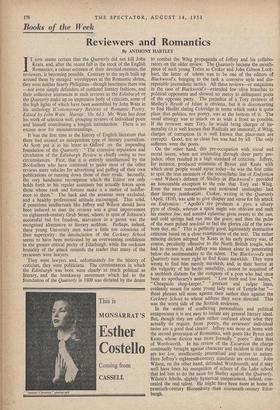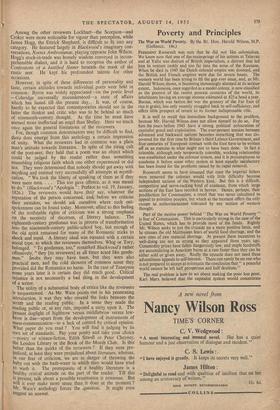Books of the Week
Reviewers and Romantics
By ANTHONY HARTLEY IT now seems certain that the Quarterly did not kill John Keats, and, after the recent fall in the stock of the English Romantics, a calmer estimate of their devoted enemies, the reviewers, is becoming possible. Contrary to the myth built up around them by enraged worshippers at the Romantic shrine, they were neither hearty Philis,tines—though heartiness there was —nor even simply defenders of outdated literary fashions, and their collective utterances in such reviews as the Edinburgh or the Quarterly make 'up an impressive body of criticism, some of the high lights of which have been assembled by John Wain in his anthology (Contemporary Reviews of Romantic Poetry. Edited by John Wain. Harrap: 10s. 6d.). Mr. Wain has done his work of selection well, grouping reviews of individual poets and himself contributing a longish introduction. There is no excuse now for misunderstandings.
It was the first time in the history of English literature that there had existed an independent type of literary journalism. As Scott put it in his letter to Gifford on the impending foundation of the Quarterly: " The extensive reputation and circulation of the Edinburgh Review is chiefly owing to two circumstances. First, that it is entirely uninfluenced by the Booksellers who have contrived to make most of the other reviews mere vehicles for advertising and puffing off their own publications or running down those of their rivals. Secondly, the very handsome recompense which the Editor not only holds forth to his regular assistants but actually forces upon those whose rank and fortune make it a matter of indiffer- ence to them." The hack and the amateur were excluded, and a healthy professional attitude encouraged. That solid, if penurious intellectuals like Jeffrey and Wilson should have been induced to man the reviews was a great improvement on eighteenth-century Grub Street, where, in spite of Johnson's successful bid for freedom, starvation in a garret was the recognised alternative to literary serfdom. Perhaps, indeed, these young University men were a little too conscious of their superiority : the denunciation of the Cockney School seems to have been motivated by an overweening confidence in the greater critical purity of Edinburgh, while the cocksure brutality of the attack reminds the reader that many of the reviewers were lawyers.
They were lawyers and, unfortunately for the history of criticism, they were politicians. The circumstances in which the Edinburgh was born were clearly as much political as literary, and the breakaway movement which led to the foundation of the Quarterly in 1809 was dictated by the desire to combat the Whig propaganda of Jeffrey and his collabo- rators on the older review. The Quarterly became the mouth- piece of such young Tories as Croker and John Gibson Lock- hart, the latter of whom was to be one of the editors of Blackwood's, bringing to the task a corrosive style and dis- reputable journalistic tactics. All these reviewsor magazines in the case of Blackwood's—extended few olive branches to political opponents and showed no mercy to delinquent poets of the opposite party. The. prejudice of a Tory reviewer of Shelley's Revolt of Islam is obvious, but it is disconcerting to find Hazlitt' slating Coleridge in terms which make it quite plain that politics, not poetry, was at the bottom of it. The usual strategy was to attack on as wide a front as possible. If the reviewer were Tory, he would bring charges of im- morality (it is well known that Radicals are immoral), if Whig, charges of corruption (it is well known that place-men are corrupt). Good, not so clean fun was had by all. The only sufferers were the poets. On the other hand, this pre-occupation with social and moral issues, when not misleading through sheer party pre- judice, often resulted in a high standard of criticism. Jeffrey, for instance, produced estimates of Byron and Keats with which most people would agree today—he was the first critic to spot the true ancestors of the octosyllabic line of Endynzion —and Wilson's defence of Shelley in Blackwood's provided an honourable exception to the rule that Tory eat Whig. Even the most remorseless and motivated onslaughts had their literary justification : Croker, writing in the Quarterly (April, 1818), was able to give chapter and verse for his attack on Endymion: " Apollo's fire produces a pyre, a silvery pyre of clouds, wherein a spirit might win oblivion and melt his essence fine, and scented eglantine gives sweets to the sun, and cold springs had run into the grass, and then the pulse of the mass pulsed ten-fold to feel the glories old of the new- born day, etc." This is perfectly good, legitimately destructive criticism based on 'a close examination of the text. The. rather _mincing diction adopted by Keats in his early poetry was, of course, peculiarly offensive to the North British toughs, who had to review it, and Jeffrey was almost alone in penetrating below the sentimentality to the talent. The Blackwood's and Quarterly men were right to find Keats mawkish. They were wrong to find him merely mawkish, and, in their horror at the vulgarity of his hectic sensibility, cannot be acquitted of a snobbish distaste for the company of a poet who had once been an apothecary's assistant. Low birth and low habits," " Cheapside shop-keeper," " prurient and vulgar lines, evidently meant for some young lady east of Temple-bar "- these phrases tell more against their author than against the Cockney School to whose address they were directed. This was the worst side of the Scottish reviewers.
In the welter of conflicting personalities and political antagonisms it is not easy to isolate any general literary ideal. But, though they are often rather confused about what they actually do require from poetry, the reviewers' individual tastes are a good deal clearer. Jeffrey was more at home with the second generation of Romantics, with poets like Byron and Keats, Whose diction was more formally poetic " than that of Wordsworth. In his review of the Excursion the charge continually brought against character and incident is that they are too low, insufficiently generalised and untrue to nature. Here Jeffrey's eighteenth-century standards are evident. John Wilson, on the other hand, defended Wordsworth, and it may well have been his recognition of echoes of the Lake school that led him to do the same for Shelley against the Quarterly. Wilson's febrile, slightly hysterical temperament, indeed, con- cealed the real talent. He might have been more at home in twentieth-century Bloomsbury than nineteenth-century Edin- burgh. Among the other reviewers Lockhart—the Scorpion—and Croker were more noticeable for vigour than perception, while James Hogg, the Ettrick Shepherd, is difficult to fit into any category. He featured largely in Blackwood's imaginary con- versations, Noctes Ambrosianae, playing opposite John Wilson. Hogg's stock-in-trade was homely wisdom conveyed in incom- prehensible dialect, and it is hard to recognise the author of Confessions of a Justified Sinner beneath the mask of the rustic seer. He kept his profoundest talents for other occasions.
However, in spite of these differences of personality and taste, certain attitudes towards individual poets were field in common : Byron was widely appreciated—on the poetic level —Coleridge universally misunderstood—a state of affairs which has lasted till •the present day. It was, of course, hardly to be expected that contemporaries should see in the latter the thinker and critic who was to be behind so much of nineteenth-century thought. At the time he must have seemed more ineffectual an angel than Shelley. Here we touch once again the general limitations of the reviewers. For, thongh common denominators may be difficult to find, there does emerge from this anthology a certain impression of unity. What the reviewers had in common was a plain man's attitude towards literature. In spite of the rising cult of the poet-seer, they held that a poem was an object which could be judged by the reader rather than something resembling religious faith which one either experienced or did not. They were determined that nobody should get away with anything and resisted very successfully all attempts at mystifi- cation. " We took the liberty of speaking of them as if they were mere men. . . . This too gave offence, as it was meant to do." (Blackwood's "Apologia ' : Preface to vol. 19, January, 1826.) The reviewers would have their say, whatever the reputation of the person concerned, and, before we criticise their mistakes, we should ask ourselves where such out- spokenness can be found today. Moreover, allied to this feeling of the irrefutable rights of criticism was a strong emphasis on the necessity of decorum, of literary balance. The eighteenth-century gentleman was in process of transformation into the nineteenth-century public-school boy, but enough of the old spirit remained for many of the Romantic tricks to shock and repel. A literary ideal was equated with a certain social type, to which the reviewers themselves, Whig or Tory, belonged. " To gentlemen, too," remarked Blackwood's rather offensively, " they [its reviewers] at all times acted like gentle- men." Snobs they may have been, but they were also practical men, and the cold showers of common sense they provided did the Romantics no harm. In the case of Tennyson some years later it is certain they did much good. Critical injustice is not necessarily a bad thing in the development of a writer. The utility of a substantial body of critics like the reviewers is unquestioned. As Mr. Wain points out in his penetrating introduction, it was they who created the links between the writer and the reading public. In a sense they made the reading public or, at any rate, imposed a unity upon it. The Present dogfight of highbrow versus middlebrow versus low- brow is due—apart from the development of instruments of mass-communication—to a lack of control by critical opinion. What paper do you read ? You will find it judging by its own set of standards. Pay your penny and take your choice —poetry or science-fiction, Edith Sitwell or Peter Cheyney, the London Library or the Book of the Month Club. Is this better than the quirks of the reviewers ? If they were pre- judiced, at least they were prejudiced about literature, whereas, in our fear of criticism, we are in danger of throwing the baby out with the bath-water in which they would have tried to wash it. The prerequisite of a healthy literature is a healthy critical attitude on the part of the reader. Till this is present, talk about a possible renaissance is nonsense. But will it ever make more sense than it does at the moment ? Mr. Wain's anthology forces the question. It might even suggest an answer.



































 Previous page
Previous page